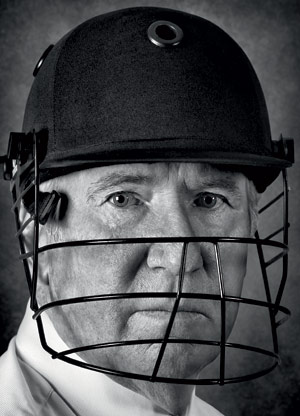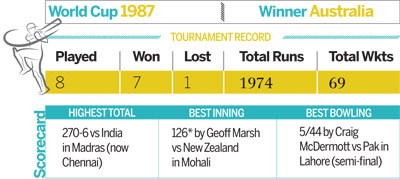World Cup (cricket): 1987
This is a collection of articles archived for the excellence of their content. |
Contents |
1987
No longer called Prudential, the 1987 Cricket World Cup was co-hosted by India and Pakistan.
It was now the Reliance World Cup
Number of overs: 50
Participating teams: 8 (Australia, England, India, New Zealand, Pakistan , Sri Lanka, West Indies, Zimbabwe)
Winners: Australia, who defeated England.
Allan Border: The captain
There were 100,000 people; 99,000 were cheering for us
Allan Border
February 5, 2015
The World Cup final at the Eden Gardens was almost like a home match played at the MCG for the Australian team as the Australian team took on England that had beaten India in the semi-final
Putting together a team practically from scratch was a slow process. The struggle began around 1984 with the retirement of great players such as Greg Chappell, Rod Marsh and Dennis Lillee, who were among a group that called it quits around the same time. Then there was the rebel tour of South Africa in 1986 that took a lot of players out of their system in a short space of time. So it was a very long rebuilding programme. It was a bit of a battle but like everything else, if you bide your time you get there slowly but surely.
The core group of the 1987 World Cup side knew Indian conditions well. We had been there the previous year on a Test match tour-that was the time of the famous tied Test in Chennai. We performed reasonably well and young stars such as David Boon, Geoff Marsh, Steven Waugh, Craig McDermott, Bruce Reid and Simon O'Donnell grew in stature during that tour. At the start of the tournament, we were rank outsiders, and justifiably so. Their results between '84 and '87 hadn't been fantastic, but we knew we had some young blokes who were starting to play some really good cricket. Bobby Simpson had become coach in the previous 12 months and that made a huge impact on their work ethic and tactics. Just having an old professional hand around was really helpful. They worked very hard on all the basics, particularly fielding. Bob was a stickler and drove us relentlessly to become the best fielding side they could be, something that showed throughout that tournament. There were very few misfields, very few catches went down, and they put a lot of pressure on all the teams they played against. Their expectations going into the tournament were to do their best. Allan Border didn't dare think about playing in the final; it was basically about taking each match as it came along, doing their best and seeing where it took them. They were the underdogs-it's good to be one because you can sneak up before anyone has looked at you very closely, especially before those big matches. And that is what happened to them.
Defeat of India
Their first match was against India, and there was an incident in it that turned out to be very important for them. They batted first and made 268. But there was a situation towards the end of the innings where Dean Jones hit a high ball that went over Ravi Shastri's head at the boundary. All of us sitting in the players' area could see it was a six, but Ravi couldn't be sure, the umpire signalled a four and they jumped up and down claiming it was a six. Their manager, a bloke called Alan Compton, said, "Oh, I'm not having that", and went up to see Match Referee Hanif Mohammad, who said, "Yes Alan, I saw that. That was a six. I'll get the score adjusted." So their score went from 268 to 270 and, well, as luck would have it, India made 269. It was quite a telling little situation, and it made such a huge difference to them as a young team to win by one run rather than lose by one run.
That win was an amazing confidence-booster and set the tone for the entire tournament. They were very good in the close games and ended second in their group behind India. Which meant they had to go to Lahore to play Pakistan in the semi-final, and no one gave them much of a chance. In that particular game, Steve Waugh hit 18 runs in the last over, beginning with a six over long-on. That last flourish took their score to 267, and there was a lot of confidence in the dressing room before they went out for a bowl. Craig McDermott had a fantastic match, everyone played well and all of a sudden they were in the final.
Final match against England
It was an exciting time for the youngsters who hadn't had a lot of success till that point. And once you make a final, you might as well try to win it! They were playing an England side that had beaten defending champions India in the semi-final, and the general feeling was that they were the underdogs. The amazing thing about that game in Calcutta was that they had the crowd's support. There were probably a hundred thousand people at the ground and I reckon 99,000 were cheering for us! It was almost like a home match at the MCG. Having that amount of support helps, and on that day it certainly did. It just makes a hell of a difference and I will always be in debt to that Eden crowd for getting us over the line, by just seven runs in the end.
Reliance Cup
Indebted to the Eden crowd: Allan border with the Reliance Cup. It was the first time I can remember an Australian one-day team in particular setting certain benchmarks they would have liked to achieve through the course of a game. Besides the bowlers, their top three batsmen were a very big component of their success. Marsh, Boon and Jones had all had a fantastic tournament and Boonie, in particular, made a 75 in the final that they were all able to bat around. Of course Mike Veletta played two fantastic knocks-one in the semi-final, and then in the final. His 45 in 31 balls at the Eden made such a difference, turning a mediocre score into a competitive 253, which was a good total for those times. He wasn't a big hitter of the ball so it wasn't like he was belting sixes everywhere; he just played dinky shots here and there and ran well.
Once again they relied on their good fielding and tight bowling that had been evident throughout the tournament, and in that last game it was just phenomenal how well they bowled and fielded. Everyone contributed to get them across the line.
They have had a brilliant run subsequently, and won the most World Cups-three in a row until India stopped us in 2011. They have been in a lot of finals, have been the side to beat and I don't think that will change in this World Cup. Australians have high expectations of the group of players they have. They will be playing in conditions that they know well, they have got great crowd support and there's no reason why they shouldn't be one of the favourite sides.
Allan Border captained the Australian side that lifted the 1987 World Cup.
Reliance, not World
Reliance Cup: Corporate extravaganza
July 15, 1987/ India Today Anil Ambani, executive director, Reliance Textiles, hasn't heard of the World Cup. "What's that?" he asks. But isn't his company sponsoring what it bills as the cricketing event of the century? "Oh, that's the Reliance Cup," he says with a straight face.
1987 WC FINAL || England v Australia || EDEN GARDENS
Henry Blofeld recalls (The Times of India):
I remember the final in Calcutta. Oh dear Mike Gatting and that reverse sweep of Allan Border. It was a shot that didn't quite come off. I believe the ball hit him on the shoulder and flew behind the stumps to Greg Dyer. He was so surprised he almost dropped the ball. I am sure England would have won without that incident. Of course they haven't won a World Cup since.It was the finishing match no one wanted as India and Pakistan had both gone out in the semi-finals. There were thousands of people but the crowd was clinical rather than passionate as it watched a neutral final.
Graham Gooch
Ayaz Memon India Today February 5, 2015 | World Cup highlights: When the greats got going
115 runs
136 balls.
Fours-11
Sixes- 0
Ask Kapil Dev about why India flopped in the 1987 World Cup semi-final and he will say candidly, adding a touch of rustic flavour, "Sab Gooch ki jhadoo ka kamal tha". It was the perfection with which he played the sweep shot at the Wankhede Stadium that put favourites India out of the final.
Gooch repeatedly went down on one knee to sweep Maninder Singh and Ravi Shastri in the arc between mid-wicket and fine leg. By the time he was dismissed for 115, England had reached 203. The target for India was 255. Almost everybody from the middle-order got a start, but could not last long enough to change the outcome of the match.
Fascinating facts about World Cups
Author: MS Ramakrishnan, Bangalore, Thu, Jan 22 2015 CricBuzz 1 <>CricBuzz 2 <>CricBuzz 3 <>CricBuzz 4 <>CricBuzz 5
1987: A captain agreed to change a four to six and his team lost by 1 run When Dean Jones lofted Maninder Singh over mid-off during a 1987 World Cup match in Madras, the umpire, who was unsure if the ball had crossed the boundary, took Ravi Shastri's word and signalled four. However, Jones walked up to umpire Dickie Bird and suggested that it was a six. Dickie then said that the issue would be discussed after Australia's innings. During the innings break, Australian team manager Alan Crompton spoke to the umpires, who then approached India's captain, Kapil Dev. A generous Kapil agreed to change that four to six, which meant India's new target would be 271. Interestingly, India went on to lose the match by 1 run.
1987: From 'Dark Horses' to World Champions Prior to the tournament, Australia skipper Allan Border said, "India and Pakistan are favourites. We are the dark horses." However, the dark horses went on to lift the 1987 World Cup. Australia then became the first team to accomplish a hat-trick, winning the 1999, 2003 and 2007 World Cups.
1987: The first ever hat-trick in the history of World Cups Chetan Sharma dismissed Ken Rutherford, Ian Smith and Chatfield off successive deliveries in 1987, thus recording the first ever hat-trick in the history of World Cups. It was also the first hat-trick by an Indian in ODIs.
1987: When Courtney Walsh became Courteous Walsh Pakistan needed 2 runs to win off the last ball in a 1987 World Cup group match at Lahore. Despite the non-striker backing up too much, Courtney Walsh, who was in charge of the last over, liberally refused to effect a run-out. Eventually, Abdul Qadir hit the winning runs and Pakistan won the match by 1 wicket.
See also
World Cup (cricket): history <>World Cup (cricket): 1975 <>World Cup (cricket): 1979 <>World Cup (cricket): 1983 <>World Cup (cricket): 1987 <>World Cup (cricket): 1992 <>World Cup (cricket): 1996 <>World Cup (cricket): 1999 <>World Cup (cricket): 2003 <>World Cup (cricket): 2007 <>World Cup (cricket): 2011 <>World Cup (cricket): 2015


